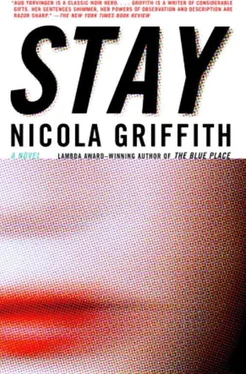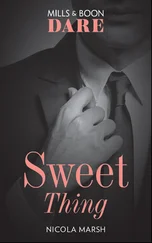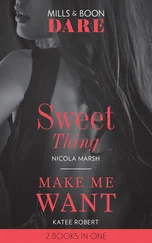“No.”
“If you were downtown on your own in”—I nearly said New York—“some big city, at this time in the afternoon, would that worry you?”
“Jesus, look, I know cities. I know how they work, what the rules are. This outdoors stuff, it’s… It just doesn’t feel safe.”
Nothing was ever safe, not the way she meant it. But she had said exposed , and I knew that word. Exposed meant going back to live in Norway when you were ten years old, speaking English with more facility than Norwegian, and already being two inches taller than your classmates. Exposed meant conspicuous, different, not fitting in, not feeling at home, at least not until you learn that your self is your home and no one can take it away—until you fall in love and are led partway down a path that disappears as abruptly as your lover and leaves you stranded, lost in the mist.
Tammy’s eyes were bright again, and her mouth twisted at one corner. “You have no idea what I’m talking about, do you?”
“Why don’t you tell me.”
After a pause she said, “I grew up in Connecticut.”
Either she’d get to the point or she wouldn’t.
“I grew up knowing the woods weren’t a place I should go. No one ever said anything straight out, but the woods were where little girls got raped and trees got hacked down and Bambi got shot. You read about it in the papers.” She shredded a blade of grass with great concentration. “It was like someone stuck big labels on everything: the woods, all the outdoors, was theirs, and if we went there, we’d end up like the deer or the trees. So, before, when you were still in bed and I was building the fire, it was like there were people in the woods watching, or animals, or whatever. They knew I was out here on my own. But it wasn’t so bad because I knew I could run into the trailer. And you being out here, now, makes it safe. Or something. And the trailer’s safe because I slept there.”
Forest can be dangerous if you don’t treat it with respect, but it’s just trees and birds and bears and beetles. I tried to think of a way to explain that. “A forest is just like a city. It can be dangerous, but if you learn what to expect and how to deal with it, you’re fine. Once you know how to read traffic signals and use a crosswalk, you’re pretty safe crossing a road. It’s the same with the woods.”
“Right.”
“You just have to get to know it, neighborhood by neighborhood, except you have streams instead of avenues. The places a stream runs through can feel like different worlds, the way, say, Park Avenue runs through both the Upper East Side and Harlem. I can show you one little neighborhood, if you like.”
A week ago, this part of the river, where trees on each side of the bank touch and merge overhead to form a living tunnel, had been a green-and-black oil painting of dark water and moss-backed boulders. Now it was as though some vandal had hurled cheap emulsion at the canvas: the arterial red leaves of a low-lying maple branch streaked violently from one bank to another, and on the far side, little poplar leaves the exact color of twenty-four carat gold lay strewn over the boulders like pirate treasure. Autumn, like grief, changes everything.
The air smelled the same, though, rich and slow and secret.
“The best times of day to see wildlife are dusk and dawn.” The sun would go down in half an hour or so. “Sit quietly, and keep still. Even blinking can be enough to scare a bird off. Watch the falling leaves—they all fall at the same speed. When something moves at a different speed, you’ll notice. Use your peripheral vision.” It was like adjusting to the rhythms of an urban beat: learn the patterns, tune them out, and the unusual is instantly apparent.
We sat still and quiet, and gradually the ever-present rush of water faded into the background and I could hear Tammy’s breath. Ten yards south, a jumble of boulders and two fallen trees helped form a quiet backwater where the black, gleaming surface barely moved.
A bright chur-wee cut through the wood, and a little bird with powder blue wings flashed out then back into the trees. Tammy jumped.
“There’ll be more. Wait.”
Then it seemed the woods were full of bluebirds with their chur-wee and tur-a-wee and rusty-colored breasts. Two females flew at each other like kamikaze pilots playing chicken and Tammy smiled, but the battle was in earnest. Everywhere at this time of year, female bluebirds fought female, and males fought male, defending territory with the snuggest nesting hollows. When winter came, the winners would survive; the losers might not. The battle gradually retreated back into the trees and the calls faded.
Something plopped in the backwater. “Turtle,” I murmured, though I hadn’t seen it. Nothing else made quite the same sound, like a dinner plate falling flat into a full sink. The light began to change, thinning from rich afternoon mead to a more sophisticated predusk Chablis which slanted in through the trees and picked up the wings of insects dancing over the surface. Far fewer than there had been two weeks ago. Seasons are like economic change: cycles of plenty and dearth.
A flash of blue and white feathers and yellow feet caught my eye for a split second, then a kingfisher was rising up out of the water with a silvery fish in its beak. It alighted upstream on the blood red maple branch over the water and looked this way and that before maneuvering the fish so that it could swallow it headfirst. Then it was off again, sturdy body and mohawk haircut disappearing as it followed its river road to wherever.
We sat for a while, until the light began to drain away in earnest. “Time to go.” When you are visiting any strange place for the first time, short visits are best.
It was darker under the trees, and I walked behind Tammy so that she could see ahead instead of looking at my back, and so that she wouldn’t have to worry about an unnameable something creeping up behind her in the glimmering dusk.
It rained on and off for two days. Tammy didn’t seem inclined to talk and it was impossible to sit for hour after hour in the trailer with rain drumming on the roof, so I took her into the cabin and showed her how to use a drawknife and a saw. We started on the interior wall. Most of the studs were up; it just needed pine board hung, and pine is an easy wood to work with. That first morning Tammy, although she tried hard, was a real hindrance; she had no idea how to hold anything, how to steady a board on a sawhorse, how to plane smoothly with a drawing knife. I demonstrated, over and over. We were both glad to break for lunch. After lunch, I gave her the task of cutting the boards to size and nailing them to the studs.
“Don’t worry about making mistakes,” I said. “That’s how you learn. If you saw something short, we put it aside and cut another. If you nail a board in the wrong place, we pull the nails and do it again. The worst thing you could do is mash your fingers flat with that hammer.” Or slice open your femoral artery if the saw skids. A sudden image of me kneeling before her, arterial blood gouting over the unfinished floor while I ran my hands up her smooth thigh and into her crotch, seeking the pressure point, made me turn away abruptly.
I worked in my corner on a piece of walnut that would become part of the stair rail, and pretended not to watch as she tucked her hair behind her ears, took a deep breath, measured once, measured twice, then cut.
She went to bed at eight o’clock that night and slept like the dead for twelve hours. I didn’t. The noises she made while she dreamt kept me awake. Her face was drawn when she woke.
“Okay?” I asked over coffee.
“My muscles ache.”
I let it pass. “Ibuprofen’s in the bathroom. And a hot shower will help.”
Читать дальше












